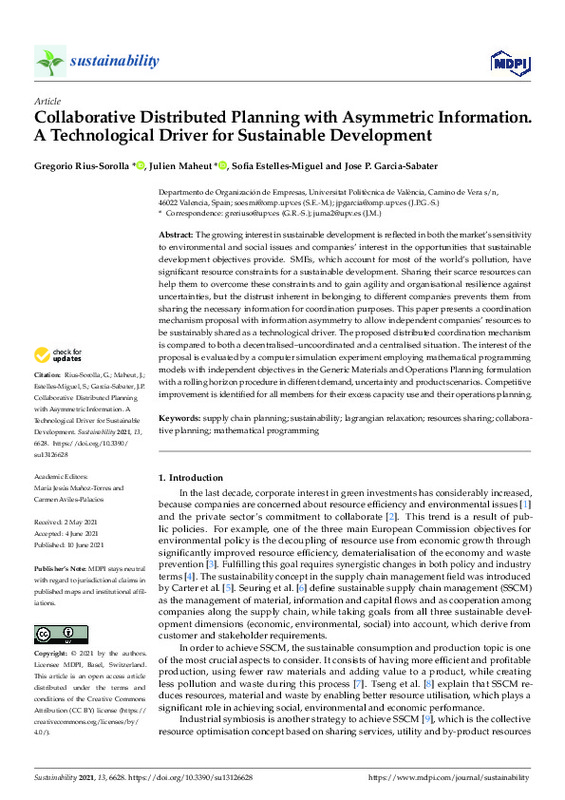JavaScript is disabled for your browser. Some features of this site may not work without it.
Buscar en RiuNet
Listar
Mi cuenta
Estadísticas
Ayuda RiuNet
Admin. UPV
Collaborative Distributed Planning with Asymmetric Information. A Technological Driver for Sustainable Development
Mostrar el registro sencillo del ítem
Ficheros en el ítem
| dc.contributor.author | Rius-Sorolla, Gregorio
|
es_ES |
| dc.contributor.author | Maheut, Julien
|
es_ES |
| dc.contributor.author | Estelles Miguel, Sofia
|
es_ES |
| dc.contributor.author | García Sabater, José Pedro
|
es_ES |
| dc.date.accessioned | 2021-11-05T14:07:47Z | |
| dc.date.available | 2021-11-05T14:07:47Z | |
| dc.date.issued | 2021-06 | es_ES |
| dc.identifier.uri | http://hdl.handle.net/10251/176303 | |
| dc.description.abstract | [EN] The growing interest in sustainable development is reflected in both the market's sensitivity to environmental and social issues and companies' interest in the opportunities that sustainable development objectives provide. SMEs, which account for most of the world's pollution, have significant resource constraints for a sustainable development. Sharing their scarce resources can help them to overcome these constraints and to gain agility and organisational resilience against uncertainties, but the distrust inherent in belonging to different companies prevents them from sharing the necessary information for coordination purposes. This paper presents a coordination mechanism proposal with information asymmetry to allow independent companies' resources to be sustainably shared as a technological driver. The proposed distributed coordination mechanism is compared to both a decentralised-uncoordinated and a centralised situation. The interest of the proposal is evaluated by a computer simulation experiment employing mathematical programming models with independent objectives in the Generic Materials and Operations Planning formulation with a rolling horizon procedure in different demand, uncertainty and product scenarios. Competitive improvement is identified for all members for their excess capacity use and their operations planning. | es_ES |
| dc.language | Inglés | es_ES |
| dc.publisher | MDPI AG | es_ES |
| dc.relation.ispartof | Sustainability | es_ES |
| dc.rights | Reconocimiento (by) | es_ES |
| dc.subject | Supply chain planning | es_ES |
| dc.subject | Sustainability | es_ES |
| dc.subject | Lagrangian relaxation | es_ES |
| dc.subject | Resources sharing | es_ES |
| dc.subject | Collaborative planning | es_ES |
| dc.subject | Mathematical programming | es_ES |
| dc.subject.classification | ORGANIZACION DE EMPRESAS | es_ES |
| dc.title | Collaborative Distributed Planning with Asymmetric Information. A Technological Driver for Sustainable Development | es_ES |
| dc.type | Artículo | es_ES |
| dc.identifier.doi | 10.3390/su13126628 | es_ES |
| dc.rights.accessRights | Abierto | es_ES |
| dc.contributor.affiliation | Universitat Politècnica de València. Departamento de Organización de Empresas - Departament d'Organització d'Empreses | es_ES |
| dc.description.bibliographicCitation | Rius-Sorolla, G.; Maheut, J.; Estelles Miguel, S.; García Sabater, JP. (2021). Collaborative Distributed Planning with Asymmetric Information. A Technological Driver for Sustainable Development. Sustainability. 13(12):1-23. https://doi.org/10.3390/su13126628 | es_ES |
| dc.description.accrualMethod | S | es_ES |
| dc.relation.publisherversion | https://doi.org/10.3390/su13126628 | es_ES |
| dc.description.upvformatpinicio | 1 | es_ES |
| dc.description.upvformatpfin | 23 | es_ES |
| dc.type.version | info:eu-repo/semantics/publishedVersion | es_ES |
| dc.description.volume | 13 | es_ES |
| dc.description.issue | 12 | es_ES |
| dc.identifier.eissn | 2071-1050 | es_ES |
| dc.relation.pasarela | S\440091 | es_ES |
| dc.subject.ods | 09.- Desarrollar infraestructuras resilientes, promover la industrialización inclusiva y sostenible, y fomentar la innovación | es_ES |
| dc.subject.ods | 12.- Garantizar las pautas de consumo y de producción sostenibles | es_ES |
| dc.subject.ods | 03.- Garantizar una vida saludable y promover el bienestar para todos y todas en todas las edades | es_ES |
| dc.subject.ods | 08.- Fomentar el crecimiento económico sostenido, inclusivo y sostenible, el empleo pleno y productivo, y el trabajo decente para todos | es_ES |
| upv.costeAPC | 900 | es_ES |








